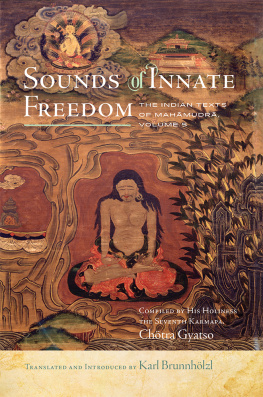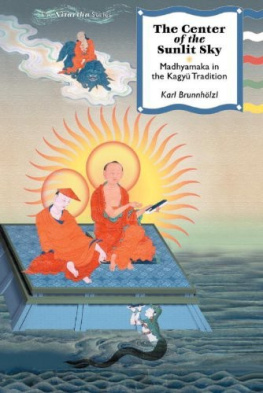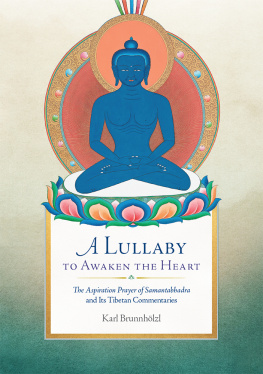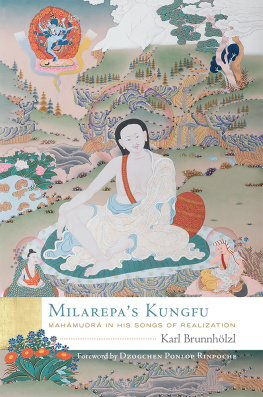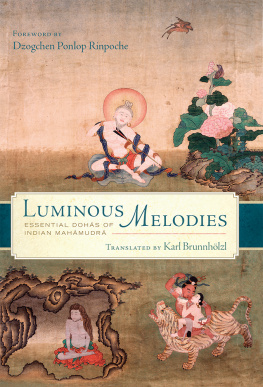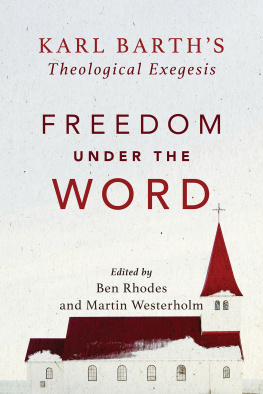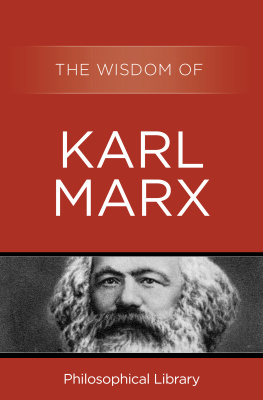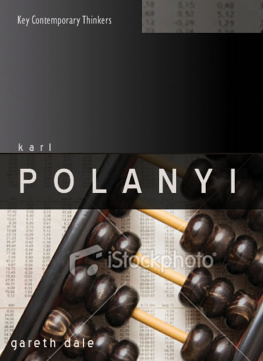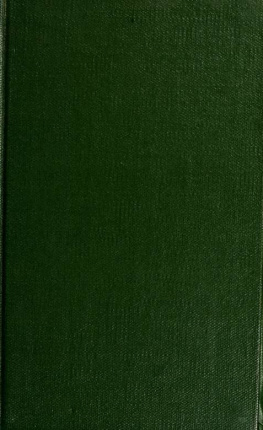Karl Brunnhölzl - Sounds of Innate Freedom
Here you can read online Karl Brunnhölzl - Sounds of Innate Freedom full text of the book (entire story) in english for free. Download pdf and epub, get meaning, cover and reviews about this ebook. publisher: Wisdom Publications, genre: Religion. Description of the work, (preface) as well as reviews are available. Best literature library LitArk.com created for fans of good reading and offers a wide selection of genres:
Romance novel
Science fiction
Adventure
Detective
Science
History
Home and family
Prose
Art
Politics
Computer
Non-fiction
Religion
Business
Children
Humor
Choose a favorite category and find really read worthwhile books. Enjoy immersion in the world of imagination, feel the emotions of the characters or learn something new for yourself, make an fascinating discovery.
- Book:Sounds of Innate Freedom
- Author:
- Publisher:Wisdom Publications
- Genre:
- Rating:4 / 5
- Favourites:Add to favourites
- Your mark:
- 80
- 1
- 2
- 3
- 4
- 5
Sounds of Innate Freedom: summary, description and annotation
We offer to read an annotation, description, summary or preface (depends on what the author of the book "Sounds of Innate Freedom" wrote himself). If you haven't found the necessary information about the book — write in the comments, we will try to find it.
Sounds of Innate Freedom — read online for free the complete book (whole text) full work
Below is the text of the book, divided by pages. System saving the place of the last page read, allows you to conveniently read the book "Sounds of Innate Freedom" online for free, without having to search again every time where you left off. Put a bookmark, and you can go to the page where you finished reading at any time.
Font size:
Interval:
Bookmark:

The texts and songs in these volumes constitute the large compendium called The IndianTexts of the Mahmudr of Definitive Meaning, compiled by the Seventh Karmapa, Chotra Gyatso (14561539). The collection offers a brilliant window into the richness of the vast ocean of Indian mahmudr texts cherished in all Tibetan lineages, particularly in the Kagyu tradition, giving us a clear view of the sources of one of the worlds great contemplative traditions. This first volume in publication contains the majority of songs of realization, consisting of dohs (couplets), vajragtis (vajra songs), and carygtis (conduct songs), all lucidly expressing the inexpressible. These songs offer readers a feast of profound and powerful pith instructions uttered by numerous male and female mahsiddhas, yogs, and kins, often in the context of ritual gaacakras and initially kept in their secret treasury. Displaying a vast range of themes, styles, and metaphors, they all point to the single true nature of the mind mahmudr in inspiring ways and from different angles, using a dazzling array of skillful means to penetrate the sole vital point of buddhahood being found nowhere but within our own mind.



As he maneuvered through the fair, he became mesmerized by a young woman who was straightening a piece of bamboo with three segments. Noticing her exceptional powers of concentration, he asked: Young lady, what are you doing? Are you an arrow-maker? Moving in closer, he saw that she had one eye closed and the other looking directly at the piece of bamboo. She was one-pointedly focused on her task, not distracted or disturbed by all the hustle and bustle of the marketplace. Nevertheless, she answered Rhulabhadra, saying: The intention of the Buddha can only be known through signs and skillful means, not through words and concepts. In that moment, the three-kya nature of buddha-mind became apparent to him through the signs and symbols the young woman, secretly a wisdom kin, had displayed. A classical text relates the insights that arose in his mind: Her one eye closed and the other open is the symbol of closing the eyes of consciousness and opening the eyes of wisdom; the bamboo is the symbol of the nature of mind; the three segments symbolize the three-kya nature; straightening is the direct path; cutting the bamboo from the root is cutting the root of samsara; cutting the top of the bamboo is cutting ego-clinging; making four slots [for feathers] is the four unborn seals of mindfulness; adding the arrowhead at the end is the need for sharp praj;...
Sudden awakening took place in his heart and he fully realized mahmudr. Recognizing that a wisdom kin was in front of him, he proclaimed, You are not an arrow-maker but a symbol-maker! From that time onward he followed her, abandoning scholarship and adopting the tantric path. He became known as Saraha or Sarahapda, the arrow shooter, referring metaphorically to he who has shot the arrow of nonduality into the heart of duality. Saraha became the foremost mahsiddha of the tantric tradition of Buddhism. The doh lineage in tantric Buddhism began when Saraha, also known as the Great Brahman, started singing spontaneous songs of realization to his disciples: the king, the queen, and the people of the kingdom. Since then, the great siddhas of the Mahmudr lineage have continued to express their realization and instructions to their disciples in pithy and spontaneous songs known as dohs. The most renowned of these many songs of realization is Milarepas Ocean of Songs, commonly known as the Hundred Thousand Songs.
The doh tradition continues today with numerous songs from my own guru, Dechen Rangdrol, a contemporary mahsiddha. I am genuinely excited to have this opportunity to work with Mitra Karl Brunnhlzl to translate the large compendium of texts called The Indian Texts of the Mahamudra of Definitive Meaning, compiled by the Seventh Karmapa Chtra Gyatso (14561539). Making this classic mahmudr literature available in English for the first time is a historic and noteworthy project. As many readers may already be aware, Mitra Karl not only is well versed in Buddhist philosophy and the Tibetan and Sanskrit languages but has also practiced these teachings for many years under the guidance of my guru, Dechen Rangdrol. Mitra Karl has also been studying with me, and I have full confidence and trust that his translation work here will be true to the original. I want to thank Wisdom Publication for their openness and support in bringing these treasures of the East to the West.
May this book help all to discover the treasure within our ordinary mind of neurosis. Dzogchen Ponlop Rinpoche Nalanda West, Seattle, WA

Font size:
Interval:
Bookmark:
Similar books «Sounds of Innate Freedom»
Look at similar books to Sounds of Innate Freedom. We have selected literature similar in name and meaning in the hope of providing readers with more options to find new, interesting, not yet read works.
Discussion, reviews of the book Sounds of Innate Freedom and just readers' own opinions. Leave your comments, write what you think about the work, its meaning or the main characters. Specify what exactly you liked and what you didn't like, and why you think so.

